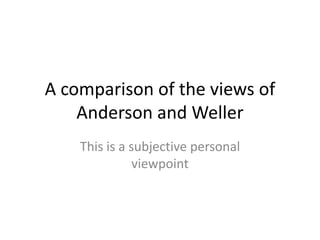
Openness
- 1. A comparison of the views of Anderson and Weller This is a subjective personal viewpoint
- 2. Common Views • Initial view of ‘open’ learning was focussed on late 1960’s desire to provide higher education access to greater numbers of the population. • The view has changed largely facilitated by technology and in particular Web 2.0, including: – Open sources, open educational resources, open courses, open data, open publishing, open support, open networks
- 3. Common Views • Open Scholar is someone who: – Online identity – Central focus of identity eg facebook – Networks – Has a Personal Learning Environment – Uses New Technologies – Engages and encourages critique – Induces others to be open
- 4. Weller’s Additional Views • It is the combination of Web 2.0 technologies and a desire to share that creates an open environment. • The degree to which openness is embraced is also shaped by the degree of ease and offers 3 levels: – Frictionless – requiring little or no effort – Quick sharing –requiring some interaction – Content Creation – requiring active participation
- 5. Weller’s Additional Views • Open Education Resources (OER’s) can be categorised as 2 overlapping elements: – ‘Big OER’s’, designed by institutions often using existing resources but presented through different processes and therefore requiring less creativity. – ‘Little OER’s’, designed by individuals using informal methods and innovation eg facebook, YouTube, and therefore being less process and more content focussed, requiring greater creativity.
- 6. Modes of learning Formal Informal Big OER’s Little OER’s cc Steve Wheeler, University of Plymouth, 2010 E-portfolios Blogging Reflective Essay writing Microblogging Group work Collaborative Social networking Co-operative learning Lower Creativity Higher
- 7. Weller’s Overview • Openness is self-generating through sharing and that creativity and openness are interlinked. ‘the genie is out of the bottle and cannot be put back’
- 8. Anderson’s Additional Views • Adopts a student centric view of the requirement. • Openness requires a change in leadership attitudes and behaviours to one which accepts disruptive technology. • Relationships are more important than information.
- 9. Collective intelligence “If you put together a big enough cc Steve Wheeler, University of Plymouth, 2010 and diverse enough group of people [.....] that group’s decisions will, over time, be intellectually superior to the isolated individual, no matter how smart or well-informed he is” ~ James Surowiecki http://thekaoseffect.com/
- 10. Anderson’s Additional Views • There are 3 overlapping learning environments each of which has value,
- 11. Group Network Collective ‘Aggregated other’ Unconscious ‘wisdom of crowds’ Stigmergic aggregation Algorithmic rules Augmentation and annotation More used, more useful Metaphor: Data Mining Wisdom of Crowds Never F2F 11
- 12. But it is the adoption of the Open Scholar characteristics that engender an attitude of lifelong learning
- 13. Personal Critique of Both Proponents • Positives – The expansion of available information and knowledge should produce a better outcome. • ‘a thousand brains must be better than one’ – The recognition that the educational context has changed since 1960’s in terms of both technology and student needs is extremely important. – The Open Scholar attitude should produce a more receptive and active student. – The recognition that institutions need a framework to ensure effective sharing.
- 14. Personal Critique of Both Proponents • Questions – There is an assumption that ‘few would argue for a closed system’ however my experience is that there are many who seek an easy life without change. – Is openness more of a Western culture or can it be accepted as a worldwide concept? – There is an assumption of confidence in sharing, critiquing et al whereas my experience is that not all students are confident to do this. – Where do the age old comments go now? • ‘in your own words’ • ‘it must be your own work, you must not plagiarise’